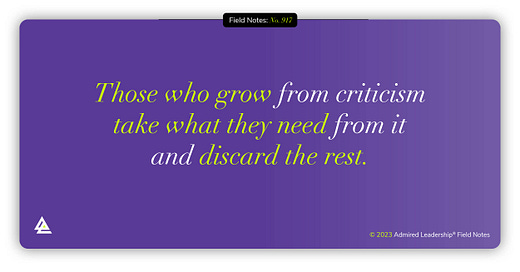Negative feedback about our work and performance stings. The more we invest in and feel pride in what we do, the more criticism burns.
As much as we might try not to, it is exceedingly difficult to avoid taking criticism personally. We wouldn’t be humans if we didn’t find ourselves at least slightly on the defensive when someone we respect finds fault in what we do. Even the smallest criticisms can put people on the defensive and make them raise their shields. Criticism is hard to swallow.
The mindset we use when hearing feedback can make us more defensive or less. How we approach what feedback is and what we should do with it has a tremendous influence on how we interpret criticism and how we respond to it.
A defensive mindset about feedback naturally amplifies the need to protect ourselves. But what if we were to view criticism differently? Not only see it as an avenue for growth and learning, but to consider the relevant parts thoughtfully and to discard the rest.
People who most benefit from feedback and criticism take a Menu approach to what they are offered. They view the points, suggestions, and criticisms others offer as something they can order and consume to satisfy their hunger for growth — or not.
They don’t select more than they can eat, only those items that look appetizing and healthy. The remainder of the entrees are ignored or considered irrelevant for now. Maybe they’ll be consumed in the future, but for this meal, the only items worthy of attention are those we want to devour and enjoy.
Those who grow from criticism take what they need from it and discard the rest. They consider the full menu and then make a considered selection. They don’t worry about what they’re not selecting or the many other items that are not relevant for this meal. They are hungry for improvement, but selective in what they consume.
Imagine ordering everything on the menu at a favorite dining spot. That would be both ridiculous and wasteful. Criticism works the same way. Order and eat what satisfies you, what will make for the best meal. Ignore the rest.
When learners take what they need from criticism to make their performance better and discard the rest, they find themselves less defensive to negative feedback. Suddenly, criticism doesn’t prick or wound. It becomes something selected or discarded.
That’s a recipe for a delicious, not noxious, meal.





Great analogy. I hope my criticism menu has some châteaubriand to go along with the ludefisk!
Good morning,
I enjoy feedback (at this point in my life), especially when it is blunt, and to the point. The perspective offered in the post is an interesting way to present growth. My main concern is that aspiring leaders will only pick what is comfortable to hear. The world is already full of individuals who don't/haven't trained to confront the brutal truths (Collins. 2001.) If you're wanting to be a Shooting Star or Golden Boy/Girl (George. 2003), that may be the path for you.
Thank you for your time.